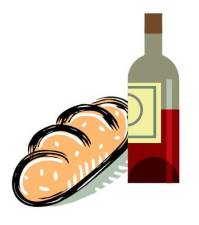 Melchizedek is a mysterious Old Testament figure. He appears on the stage out of nowhere, it seems. Then he jumps right back into obscurity.
Melchizedek is a mysterious Old Testament figure. He appears on the stage out of nowhere, it seems. Then he jumps right back into obscurity.
If you’re unfamiliar with the story, you can read it in Genesis 14:17-24. Abram and his army of servants and allies, defeated an invading army and rescued the people and possessions of Sodom, his nephew Lot among them. After this surprising victory, Melchizedek appears on the scene with bread, wine and a blessing. After blessing Abram and God, he receives a tenth of all the spoils from Abram’s hand. Then that’s it. He’s gone.
We do know a few other things about him. His name means king of righteousness, and he was the king of Salem (which means peace). He’s also referred to as a priest of God Most High. Ps. 110 speaks of Christ being a “priest forever after the order of Melchizedek” and Hebrews 7 builds on that.
For the purposes of my post, it’s clear that Melchizedek is a type of Christ (see Heb. 7:3). He is a Priest-King, and Jesus is the Prophet-Priest-King. Considering that God knew all along that Melchizedek was a type of Christ, and since God orchestrates all of history, including the events of Genesis 14, I think there is something for us to learn here from Melchizedek’s bringing bread and wine to Abram.
I was reading the 8th portrait of Christ in Bob Beasley’s book 101 Portraits of Jesus in the Hebrew Scriptures, when I was struck by this simple line, “He [Melchizedek] brings bread and wine, elements we use in the Lord’s Supper.” Melchizedek brought bread and wine, like in the Lord’s Supper. So I thought, what does this teach me about the Lord’s Supper? The answer might seem too simple and obvious but I think it is quite important.
The Lord’s Supper is a blessing that Jesus brings to us. It isn’t just a rite to be observed, but Jesus, comes to us bringing bread and wine. He blesses us through the meal He shares with us. As Melchizedek blessed Abram along with the bread and wine He shared with him, so Christ blesses us as we partake of holy communion.
The supper, after all, is Christ’s idea, His ordinance for His church. He says the elements represent His body and we should remember Him as we eat of it. In previous posts on the Lord’s Supper, I’ve shown how the idea of sharing a meal with God is behind the Lord’s Supper in part. I mentioned before that Wayne Grudem highlights Ex. 24:9-11 and Deut. 14:23-26 as examples of God’s eating with men. Perhaps this story of Melchizedek foreshadows those meals as well.
In the Supper, all the blessings we get come from Christ. Ultimately the bread and wine come from Him as well. This coming Sunday we’ll partake of the Lord’s Supper at my church, and I am eager to receive a blessing from the hand of Christ my Melchizedek. A blessing given through my enjoyment of the joy of wine, and the sustenance of bread. May Jesus be ever more my blessing, my joy, and my life’s sustenance. Amen!
Like this:
Like Loading...
 This past Sunday I was again privileged to fill in for our pastor by delivering the Sunday morning message. My theme this time was baptism, and I took as part of my title, the question that Ananias asked the future Apostle Paul before his baptism in Acts 22:16. He asked “why do you wait?” I enjoyed tracing the pattern of baptism as seen in the book of Acts and spent time talking about what baptism symbolizes and what it does (and doesn’t) do. I also looked at when it is appropriate to wait.
This past Sunday I was again privileged to fill in for our pastor by delivering the Sunday morning message. My theme this time was baptism, and I took as part of my title, the question that Ananias asked the future Apostle Paul before his baptism in Acts 22:16. He asked “why do you wait?” I enjoyed tracing the pattern of baptism as seen in the book of Acts and spent time talking about what baptism symbolizes and what it does (and doesn’t) do. I also looked at when it is appropriate to wait. I recently came across some posts by
I recently came across some posts by  Melchizedek is a mysterious Old Testament figure. He appears on the stage out of nowhere, it seems. Then he jumps right back into obscurity.
Melchizedek is a mysterious Old Testament figure. He appears on the stage out of nowhere, it seems. Then he jumps right back into obscurity.